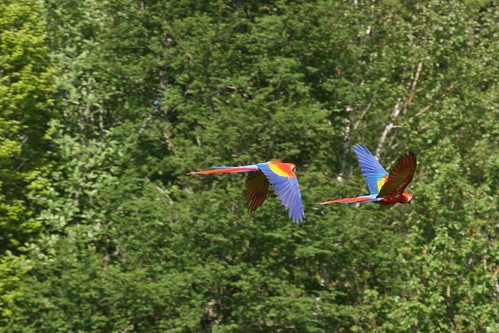 Another 10 Scarlet Macaws fly free.A breeding programme in Mexico makes its third release of macaws into the wild this year a part of its effort to revive the country's struggling population of scarlet macaws.
Another 10 Scarlet Macaws fly free.A breeding programme in Mexico makes its third release of macaws into the wild this year a part of its effort to revive the country's struggling population of scarlet macaws.
As part of an ambitious scarlet macaw captive breeding program, another 10 macaws on Sunday were released into the National Park of Palenque, located in Mexico's southern state of Chiapas.
This brings the total number of macaws released into the wild to 37 in a third effort so far this year.
Palenque is home to the Aluxes ecological reserve, which specializes in the conservation of wild species.
The historic habitat of the scarlet macaw in Mexico once extended from Tamaulipas, south of the border with Texas, to the humid jungles adjacent to Guatemala.
But in the last 70 years, habitat destruction and illegal trade has dramatically reduced and divided their populations into two separate bastions in the southern jungle of Mexico.
This separation has had a devastating impact on the species which is why biologists decided to release the birds in Palenque to bring both groups of remaining macaws in Mexico closer.
Since December 2012 red Macaws have been brought from Xcaret to Aluxes where they go through a process of environmental adaptation.
They are taught to recognize their food in the wild, identify their natural predators, find shelter between trees, and to fly freely.
Honorary President of Aluxes Ecological Park, Patorcionio Gonzalez, says park officials will train members from local communities to become bird watching guides for visiting tourists.